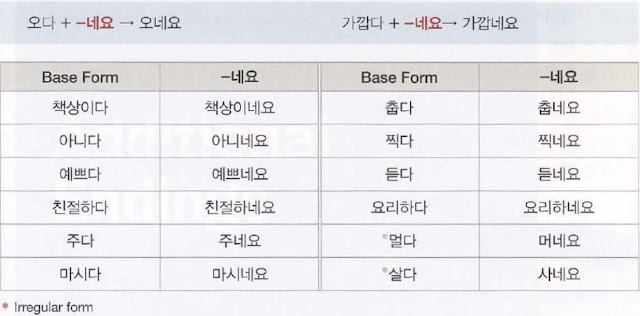[Korean grammar] A/V-네요 Discovery and Surprise
벌써 여름이네요.
Wow, it’s already summer.
가족이 많네요.
You certainly have a large family.
글씨를 잘 쓰네요.
You really have good handwriting.
책을 많이 읽었네요.
You really have read a lot of books.
Grammar Focus:
-네요 is used to express surprise or wonder upon learning something through direct experience or when agreeing with something said by someone else. It is made by adding -네요 to the stems of adjectives and verbs. It corresponds to ‘really’, ‘certainly’, ‘wow’, or ‘My(!)’ in English.
1. Expressing surprise or wonder upon learning something through direct experience:
A: 한국말을 정말 잘하시네요. You really do speak Korean well.
(While witnessing a friend speak Korean)
B: 아니에요. 더 많이 공부해야 돼요.
Not really. I have to study a lot more.
2. Agreeing with something said by someone else.
A: 오늘 날씨가 줍지요? Isn’t it cold today?
B: 네, 정말 줍네요. Yes, it really is cold.

A: 남편이 키가 크시네요. Your husband is really tall!
B: 네, 187cm(센티미터)예요. Yes, he’s 187 cm tall.
A: 제 선물이에요. 빨리 열어 보세요.
It’s a present (I got it for you). Go ahead and open it.
B: 예쁜 목도리네요. 고마워요. 겨울에 잘할게요.
What a beautiful scarf! Thank you. I’ll wear it often in winter.
A: 우리 딸이 그린 그림인데 어때요?
What do you think of this painting by my daughter?
B: 정말 잘 그렸네요. 언제부터 그림을 배웠어요?
My, she really painted well! When did she start learning to paint?

